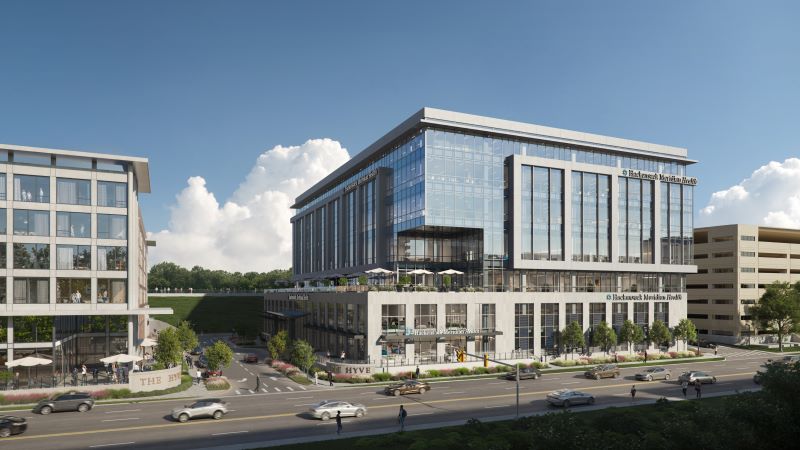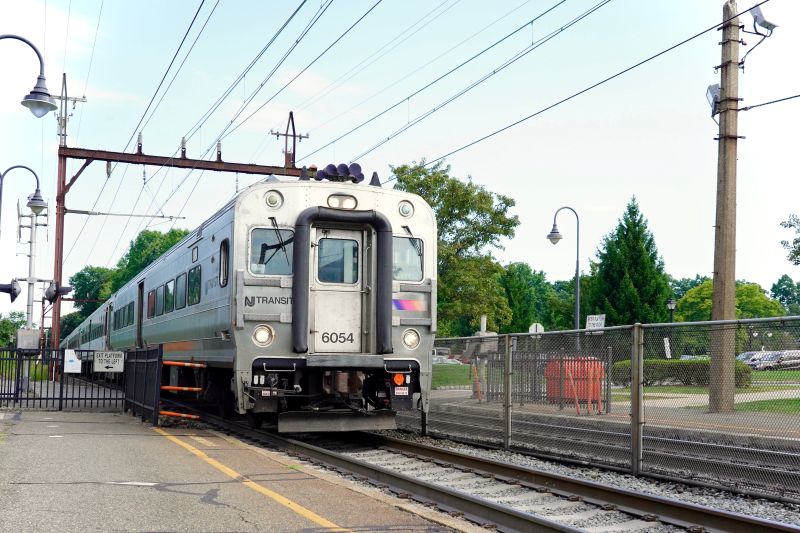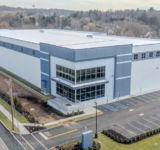By Joshua Burd
NJ Transit has unveiled a plan to redevelop or better leverage its 8,000-acre real estate portfolio, touting the potential to create up to $1.9 billion in new revenue in the coming decades.
According to the agency, much of that could come via land leases or sales of parcels near train or bus stations that could support between 14,000 and 20,000 housing units over the next 30 years, including affordable housing. There’s also the prospect of developing roughly 50 to 100 acres within its portfolio as warehousing and industrial uses, along with expanded retail concessions, new advertising revenue and re-examining how it collects parking fees.
NJ Transit CEO President and Kris Kolluri unveiled the framework — known as The LAND Plan: Leveraging Assets for Non-farebox Dollars — during an event Wednesday at the busy Metropark station in Woodbridge, joining local and state officials and other stakeholders.

“This first-of-its-kind plan delivers a roadmap for the next administration that maximizes non-farebox revenue opportunities for NJ Transit, the State of New Jersey and the municipalities we serve,” Kolluri said. “The plan’s proposed actions are presented merely as options for consideration — not mandates — to support the plan’s full revenue potential. I have a deep respect for home rule in New Jersey and the legislative process, and look forward to working collaboratively with the Legislature, municipalities and elected officials across the state.”
To be sure, the eight-page document emphasizes both revenue opportunities and policy and regulatory changes that would support them. That includes enhancing the state’s Transit Village Initiative Task Force and incentivizing municipalities to appropriately develop land at their transit hubs, along with legislative action that would classify NJ Transit-owned parcels within walking distance of its facilities as areas in need of redevelopment.
The framework — which drew praise from the state’s top commercial real estate industry association — also calls for the agency to prioritize potential development initiatives, strengthen internal governance and project delivery processes and expand and modernize agency capabilities. Other recommendations include new legislation to give NJ Transit more authority in land use on its properties and related financing tools.

“We support and stand ready to assist NJ Transit leadership as it implements this blueprint to leverage its existing assets,” said Dan Kennedy, CEO of NAIOP New Jersey. “Establishing this strategic direction, including a set of reasonable options for stations and surrounding assets to become catalysts for growth, is a major step forward. We believe strongly that the private sector can be a reliable partner in improving transit-oriented destinations where people, business, and innovation come together to thrive all while improving the user experience for all.”
The report’s projections for non-farebox revenue over the next 30 years include:
- $780 million to $1.1 billion from transit-oriented development and a major expansion of the 400 to 500 new housing units per year, including affordable housing, that NJ Transit currently supports
- $150 million to $300 million from industrial developments on large, flat parcels with good road access and utilities
- $15 million to $30 million from temporary uses and short-term activities such as events, filming and pop-ups that use land, structures and vehicles
- $80 million to $100 million from retail tenants occupying concession spaces in NJ Transit facilities, providing desirable customer amenities
- $40 million to $130 million from advertising on digital displays, within station facilities, on vehicles and through naming rights arrangements
- $170 million to $230 million from optimizing the parking fees collected at station lots, which are sometimes shared with municipalities or private operators

The report also outlines the potential to restore or preserve 150 to 170 acres of wetlands and leverage ecological credits, with the highest value in contiguous conservation areas and watershed management areas otherwise impacted by service development, according to a news release. Additionally, NJ Transit said it can provide opportunities to develop up to five megawatts of solar power generation projects across multiple redevelopment sites, including surface parking canopies and rooftop installations.
“We are pleased at the potential for New Jersey in this unique study,” Woodbridge Mayor John McCormac said. “Access to commuting options, housing, retail and now expanded health care options are what the entire state can benefit from through this plan. We applaud NJ Transit for this groundbreaking work.”
All told, the agency said the plan could add up to $14 billion in economic impact to New Jersey and up to $1.6 billion in municipal revenues, while creating up to 50,000 jobs. The estimates, which are derived from internal NJ Transit analysis, would support the agency’s ability to deliver lasting, reliable and high-quality service.
“NJ Transit is a lifeline for all New Jerseyans, helping residents commute to work and school and attend to personal needs. It’s also a powerful contributor not just to New Jersey’s economy but the nation’s,” said state Sen. Patrick Diegnan, who chairs the Senate Transportation Committee. “This analysis provides a self-sufficient way to help keep NJ Transit funded and is a major boost to New Jersey’s economy.”
The location for Wednesday’s announcement was significant, highlighting not only one of NJ Transit’s busiest stations but the site of a transformative mixed-use development that broke ground last year. Spearheaded by Russo Development, Onyx Equities and Terminal Construction, the project includes a nearly 250,000-square-foot corporate and medical office building for Hackensack Meridian Health that is nearing completion, with 235 apartments and retail space still to come.
“At Hackensack Meridian Health, we understand the vital role public transportation plays in our communities and believe in the possibilities that emerge when the public and private sectors work together,” said Jose Lozano, Hackensack Meridian Health executive vice president and chief growth officer. “We are proud of our partnership with NJ Transit in creating an exceptional new facility at Metropark, expanding access and providing world class services for New Jerseyans. Our project is a perfect example of the greater potential unlocked through NJ Transit’s impactful real estate plan. We look forward to continuing our partnership in the coming years.”









